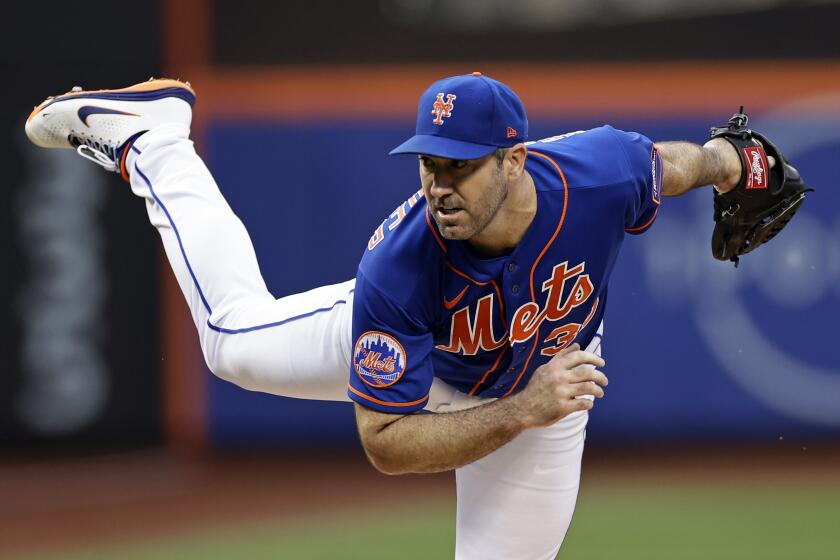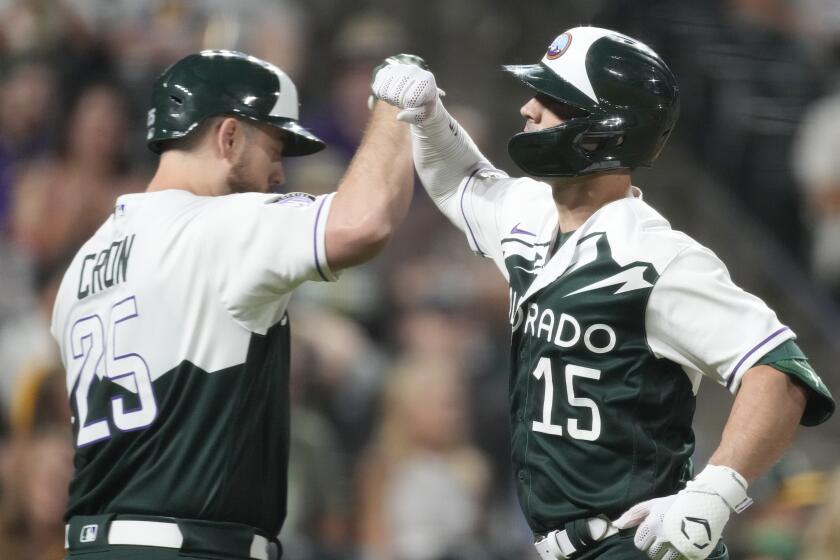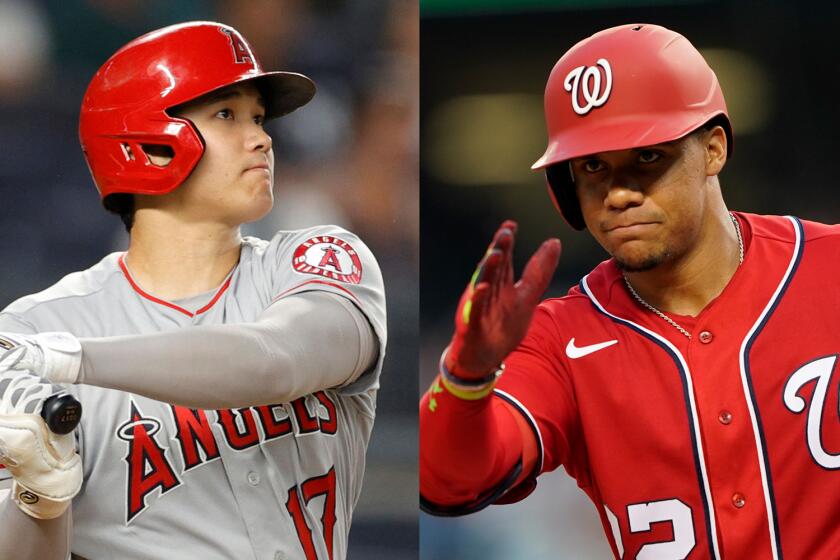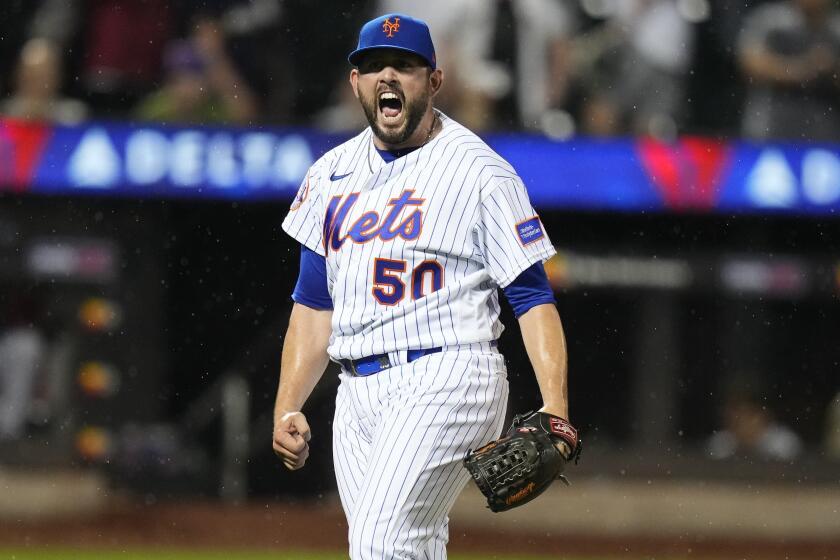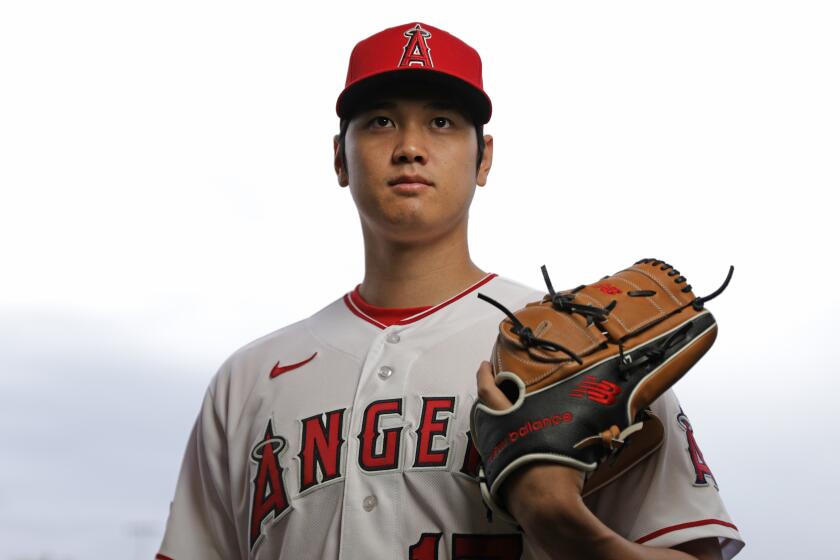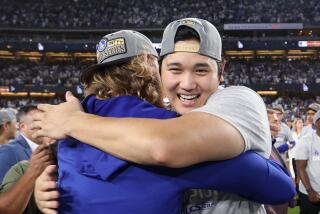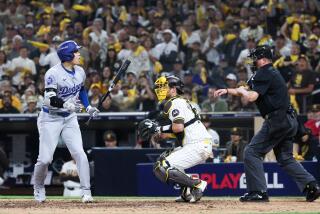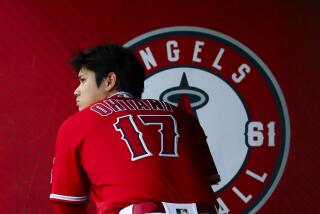MLB trade deadline roundtable: Shohei Ohtani stays, Dodgers can’t upgrade, what now?
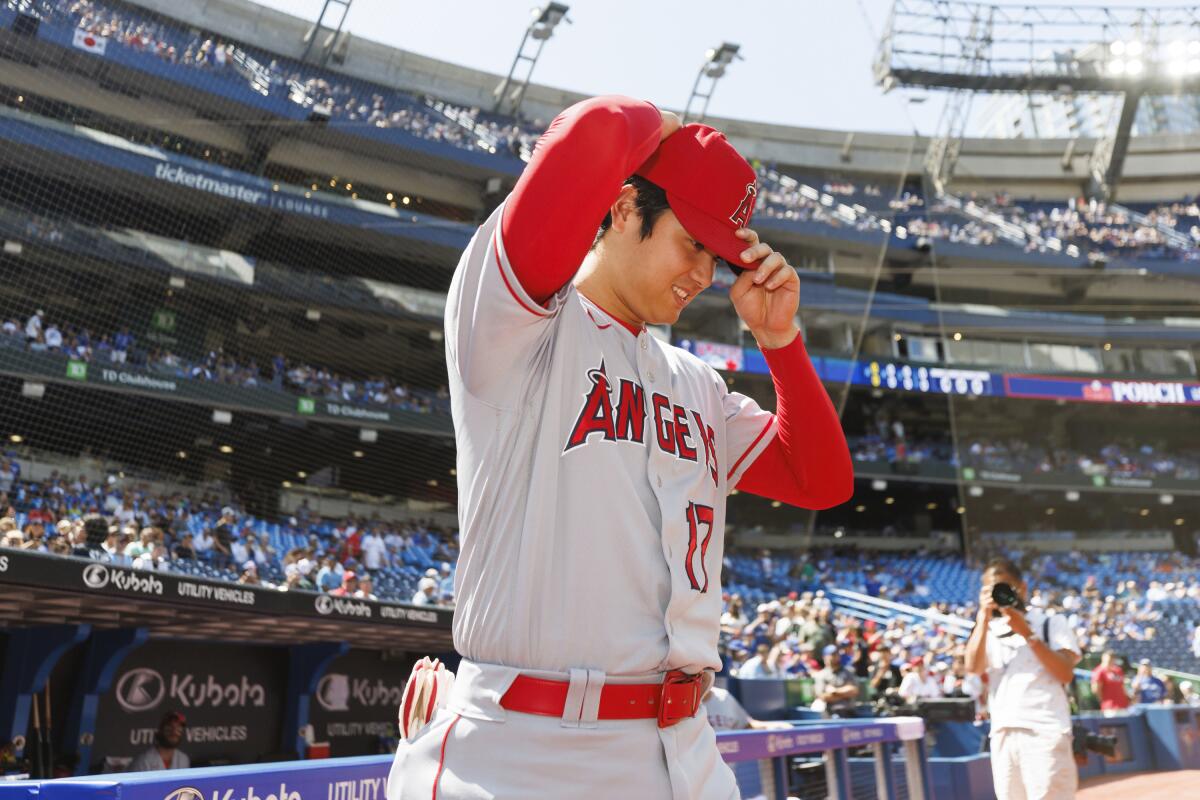
- Share via
Shohei Ohtani is still an Angel?
Justin Verlander, again, is not a Dodger?
The Angels were actually buyers at the trade deadline?
Eduardo Rodriguez picked the Tigers over the Dodgers?
Surprisingly, the answer to all those questions is a resounding yes. And with Major League Baseball’s trade deadline having passed, the Dodgers and Angels know what their rosters will be for the final two months of the regular season and — they both hope — the postseason.
In a roundtable moderated by Times baseball editor Hans Tesselaar and deputy sports editor Ed Guzman, Times writers Jack Harris, Sarah Valenzuela, Jorge Castillo and Bill Shaikin discussed what the Dodgers and Angels accomplished (or didn’t accomplish) at the trade deadline.
The Dodgers knew they needed to make some moves to improve the roster, but with nearly all of their intended trade targets they encountered issues.
If a month ago you would have been told that the Angels would keep Shohei Ohtani and the Dodgers would not be able to land a front-line starting pitcher, what would you have said?
Harris: Actually, that wouldn’t have been a big shock. Despite the Angels’ place in the standings, they indicated all along their preference was to keep Ohtani. Despite the Dodgers’ struggles with the rotation, the expected high prices for pitching this deadline were always going to make a big splash difficult.
That said, the Dodgers’ inability to further bolster their pitching staff will loom as a worry the rest of the season. The Angels are also taking a gamble by holding onto Ohtani. Both situations will be easy to second-guess this winter. But both were definite possibilities entering deadline season, too.
Shaikin: Sounds about right. The Angels had said all along they wouldn’t trade Ohtani, and certainly not if they were in contention. The Dodgers got caught up in supply and demand: too few front-line starting pitchers available, too many teams trying to get one, and a disciplined practice of not trading their very best prospects.
Valenzuela: As far as Ohtani goes, I would not have been surprised. Even before the season began, Angels owner Arte Moreno would not speak to a “what if” scenario in an interview with Sports Illustrated on a trade scenario involving Ohtani, saying they would not trade Ohtani if they were in position to land a playoff spot. Further, in a scrum Moreno held with beat reporters back in Arizona, the discussion about Ohtani seemed to revolve around the Angels’ focus on keeping Ohtani long term. And when asked directly in June if the Angels intended to keep Ohtani no matter where the team was at the deadline, general manager Perry Minasian said “it’s pretty self-explanatory.”
Castillo: The Dodgers are in trouble and the Angels made the right move.
It wasn’t a secret; the Dodgers really wanted a top-of-the-rotation starter. Who, exactly, was the question. The market was never expected to teem with those options. The Cubs’ decision to not sell, taking Marcus Stroman off the market, further limited the selection.
In the end, they wound up with Lance Lynn and Ryan Yarbrough. Both should help. But neither is a Game 1 or 2 starter unless disaster strikes. Now the Dodgers must bank on Julio Urías rebounding and Clayton Kershaw returning healthy for a trusted one-two playoff punch.
As for the Angels, my opinion on their looming decision never changed: If they were within striking distance they were never going to trade Ohtani. And why would they? What’s the point of all this? They have a superstar, a once-in-a-generation talent who actually deserves the hyperbolic descriptor.
In the last five weeks, the Angels have made several moves to improve their roster and, they hope, show Shohei Ohtani that they are serious about winning.
This certainly was a different front-office approach by the Angels this trade season. Are you surprised they went all in? And was it the right call to not trade Ohtani, who can leave the team as a free agent after this season?
Valenzuela: I’m not surprised they went all in. As close as they were leading up to the trade deadline, given the stakes of what they hope to accomplish and accounting for injuries, they needed to add reinforcements. I think it was the right call not to trade Ohtani given where they were in the standings. It’s hard to know what they could have gotten in a hypothetical trade, but losing a player like Ohtani in the middle of the season would have needed to involve receiving multiple prospects/players that could contribute sooner rather than down the line for it to have been a worthwhile trade, in my opinion. That said, I think the best time to trade Ohtani was probably last season.
Harris: Time will obviously tell. But two things are true: The Angels will likely only be contenders in the next couple seasons if they keep Ohtani. And while retaining him seemingly remains unlikely, it might have been virtually impossible if they dealt him at the deadline, too. So, I’m all for the Angels making a real run this season. They just better hope it leaves a positive impression on the two-way star, too.
Shaikin: “All in” is a relative term here. The Angels didn’t absorb any enormous contracts, and their farm system isn’t that good in the first place, so trading minor leaguers is less likely to hurt them than to hurt, say, the Dodgers.
And, yes, the Angels made the right call with Ohtani. Remember, Ohtani is two months from free agency, so any team trading for him would be one that could win this year — and any such team would trade prospects, not break up its major league roster. The Angels plan on contending next year, so a bunch of prospects that might be two or three years away would not help.
Frankly, the Angels are trying to win. More people should be cheering that, as opposed to calculating odds and criticizing the Angels for not trading away baseball’s best player for a bag of prospect beans. In 2018, the Dodgers traded five prospects for Manny Machado. You know how many of those five are in the majors now? One — a starting pitcher with a 4.66 ERA.
Castillo: No, I’m not surprised. They weren’t going to trade Ohtani if they were in the race and that’s what happened.
Do I think it was the right call? I hear people when they say the Angels should’ve traded Ohtani for young, cheap talent to jump-start a rebuild. They’re risking losing him for one measly draft pick. They say smart organizations would’ve done that. But you know what? The Angels haven’t operated very intelligently for a long time. That’s why they haven’t reached the postseason in nearly nine years. That’s why their farm system has been so unimpressive for so long. The time to trade Ohtani was last summer when the postseason was a pipe dream and multiple contenders would’ve traded a boatload of top-end prospects for two postseasons of Ohtani.
Once the Angels start negotiating with Shohei Ohtani on a new deal, the franchise should take the same approach the Nationals did with Juan Soto.
Trout’s 32nd birthday is this weekend. He doesn’t have many prime years left. What are you waiting for? They have a chance. Time to go for it.
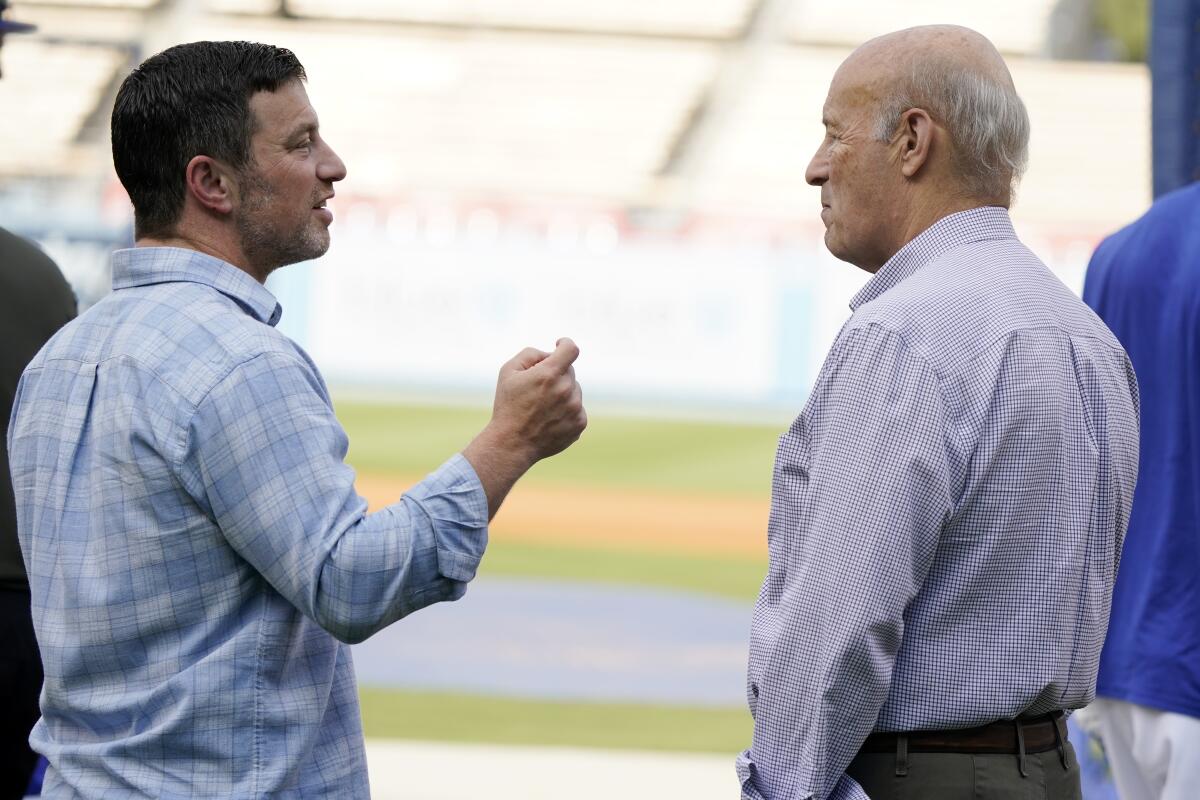
Andrew Friedman and the Dodgers always do something major at the trade deadline. So what happened this time?
Harris: Well, not always (see 2020, when their deadline inactivity was a nonissue, and last year, when their lack of moves backfired in the playoffs). However, this might be the first time they wanted to make a big move but failed to do so.
There are two main reasons: One, the Dodgers balked at the high prices for most rental players on the market. Two, the deals they did have traction on (namely, Justin Verlander and Eduardo Rodriguez) fizzled for reasons somewhat out of their control (Verlander’s preference to go to Houston, and Rodriguez’s decision to not waive his no-trade clause to go to Los Angeles).
Should they have been more willing to part with top prospects, perhaps to acquire a rental like Lucas Giolito or Jordan Montgomery? It’s a fair question to ask — and one that will loom over the rest of their season.
Castillo: Three reasons:
- The trade deadline ain’t what it used to be. This was the second deadline since Major League Baseball expanded the postseason to 12 teams. More playoff spots means more teams in contention, which means fewer sellers, which means less inventory to pick from. The Dodgers didn’t make a blockbuster midseason trade in either year. One could argue they weren’t desperate for a move last season as they cruised to 111 wins, but this year was different. A combination of factors, including prices the Dodgers weren’t comfortable paying, produced minor moves and no splash.
- The Dodgers signaled that they weren’t going to spend — whether money or player capital — for high-priced talent last offseason. Remember? They didn’t sign a free agent to a contract longer than one year. Their only noteworthy trade was for Miguel Rojas. As Dylan Hernández mentioned this week, Trevor Bauer’s uncertain status — he was released in January — could have played a role, but their activity around the trade deadline resembles their offseason moves.
- Eduardo Rodríguez chose Detroit over Los Angeles (if you think Rodríguez would have been a “major” move).
Andrew Friedman says the Dodgers want to win a World Series, but Dylan Hernández argues Friedman’s trade deadline actions suggest otherwise.
The Angels believe they are a better team now than they were five weeks ago. Are they good enough to make the playoffs as a wild-card team or even as a division champion?
Valenzuela: I think this will present itself after Brandon Drury and Mike Trout, in particular, return. On paper, this team is better than five weeks ago, having rebuilt some of the depth they lost. Drury and Trout returning should help spark the offense. Logan O’Hoppe possibly able to return by the end of the month could also help their chances. But they can’t afford another long stretch of inconsistencies (in any phase of the game). I think they are good enough to be a wild-card team if they don’t get in their own way.
Harris: They could be, but it won’t be easy. Obviously, they need Ohtani to keep playing like an MVP. They need to get back some injured players — particularly Mike Trout. And they’ll need an improved but imperfect rotation to be at its best.
If the Angels are playing in October, they could be a dangerous, star-studded Cinderella, similar perhaps to last year’s pennant-winning Phillies team. But getting there will be a tough task, one in which they still need a lot to break their way.
Shaikin: The odds say no, but that’s why we play the games. Their August schedule is brutal, but their September schedule starts and ends with the A’s.
Castillo: Yes, but as a wild-card team only. The Angels remind me of the 2019 Washington Nationals and the 2022 Philadelphia Phillies — teams loaded with elite talent but lacking depth that sneaked into the postseason. Those clubs reached the playoffs as wild-card entrants. Both went to the World Series. The Nationals won it all. I’m not saying the Angels are going to reach the World Series, but they’re good enough to play in October. Recent history suggests anything can happen when a talented team snags a spot and gets hot.
The Angels capped a busy summer of trades by acquiring reliever Dominic Leone from the Mets in exchange for minor leaguer Jeremiah Jackson.
Even though the Dodgers didn’t connect big in the trade market, they still are a first-place team. Will they still be at season’s end?
Harris: Probably, but it’s hardly a guarantee. The second-place Giants didn’t do much, but entered Wednesday only 2½ games back. The third-place Diamondbacks did make upgrades, and could feasibly make up their 4½-game deficit. And then there are the Padres, who are 8½ games back but will have an opportunity to start making up ground with four games against the Dodgers this weekend.
Squandering the division would be a nightmare for the Dodgers, who still have an edge over all those teams. But if their rotation keeps floundering, or if another rash of injuries strikes the team, they could find themselves in a late-season dog fight for a second straight NL West title.
Shaikin: Yes.
Castillo: Yes. The only NL West rival on their talent level is the San Diego Padres and I think they’ve dug too deep a hole to catch the Dodgers. I don’t think the other contenders — the San Francisco Giants and Arizona Diamondbacks — have the pieces to keep up. That said, the Dodgers play seven of their final 10 games against the Giants. Those games could decide their season.
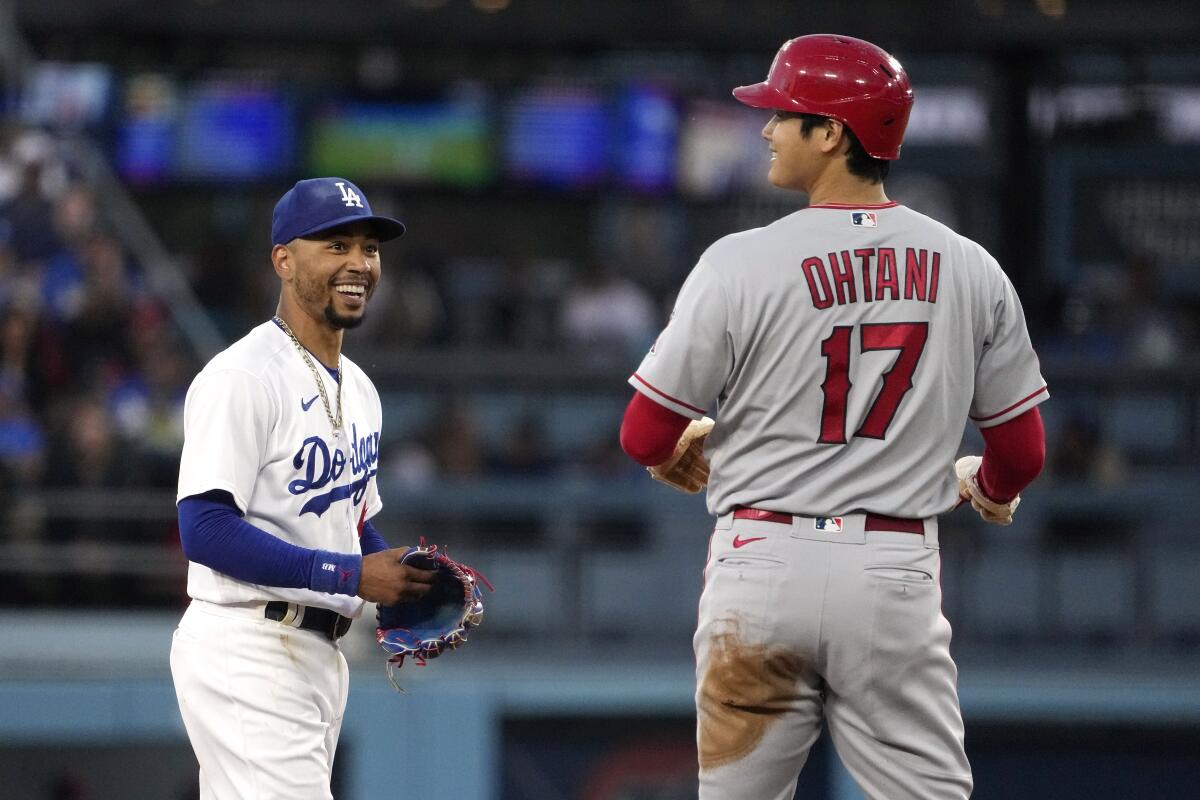
Has the Dodgers’ way of operation since the end of last season all been a part of a master plan to land Ohtani in free agency?
Harris: There might not be a “master plan,” but Ohtani’s looming free agency is being factored into each of the Dodgers’ decisions. It’s no surprise they built this season’s team on mostly one-year contracts. Or that they were wary of parting with their top prospects at the deadline. They’re trying to preserve as much financial flexibility and roster depth as possible. And Ohtani is one reason why.
Shaikin: The Dodgers already have $113 million in salaries committed for 2024, according to Spotrac.
The Angels: $131 million. The Padres: $165 million. The New York Yankees: $188 million. The Texas Rangers: $192 million. The New York Mets: $198 million.
You decide.
Castillo: I believe so. The organization has coveted Ohtani since he was a high school star in Japan more than a decade ago. They want him. And they’re going to try hard to sign him.
Twice the Dodgers were considered the favorites to land Shohei Ohtani. Twice the Dodgers failed. Why will it be different this offseason with the organization’s white whale?
Speaking of the two-way superstar, where will Ohtani be playing next season?
Valenzuela: The multimillion-dollar question! For as much attention the “Ohtani is leaving” rhetoric gets, no one should be surprised if he decides to stay. After all, on which other team would Ohtani be allowed the same level of comfort as far as deciding when he will speak to media and working off his own schedule?
Harris: Somewhere in the Southland. If Ohtani leaves Anaheim, there are few clubs seemingly better-positioned than the Dodgers, who can tout their status as annual contenders, their impressive facilities and support staff, and give Ohtani some level of familiarity by staying in Southern California.
Don’t count the Angels out, though. They’ve been as appeasing as possible to the two-way star during his MLB career. And while the team has struggled during his time in Anaheim, Ohtani has accomplished many of his personal goals in an Angels uniform. No one knows exactly what the Japanese superstar values most. But if continuity is high on his wish list, maybe the Angels aren’t as much of a long shot as the industry has long believed.
Shaikin: If it’s not the Angels or Dodgers, how about the Giants? San Francisco has tried — and failed — to shovel money at Bryce Harper, Aaron Judge and Carlos Correa in recent years. The Giants make gobs of money, and emerging youngsters like catcher Patrick Bailey, infielder Casey Schmitt and pitcher Kyle Harrison could make Ohtani feel that he wouldn’t be marooned over the long term.
Castillo: My prediction — as of me typing this on Aug. 2 — is he chooses the Angels over the Dodgers, Giants, and Red Sox. But get back to me next week. I’ll probably change my mind (again).
More to Read
Go beyond the scoreboard
Get the latest on L.A.'s teams in the daily Sports Report newsletter.
You may occasionally receive promotional content from the Los Angeles Times.
